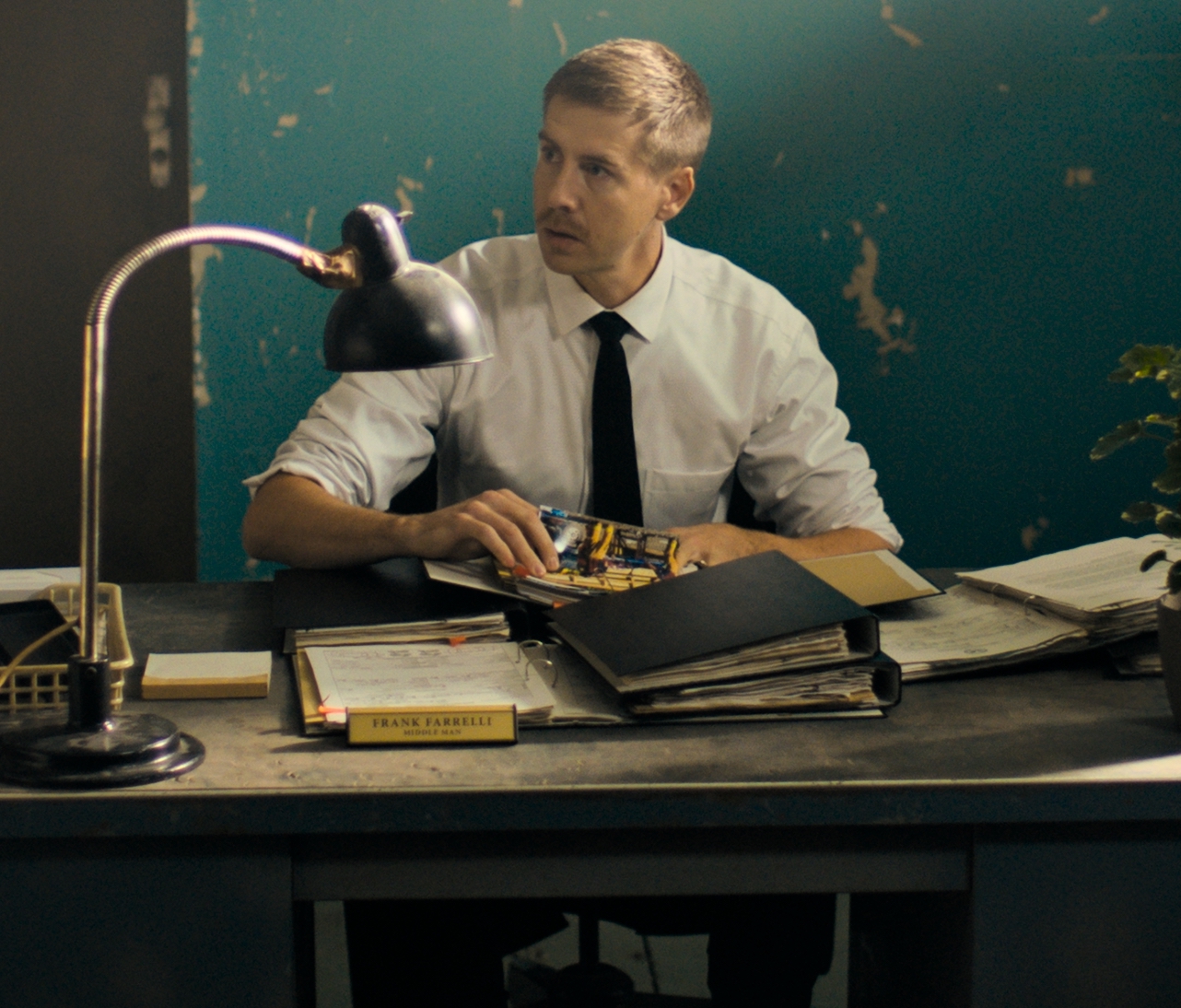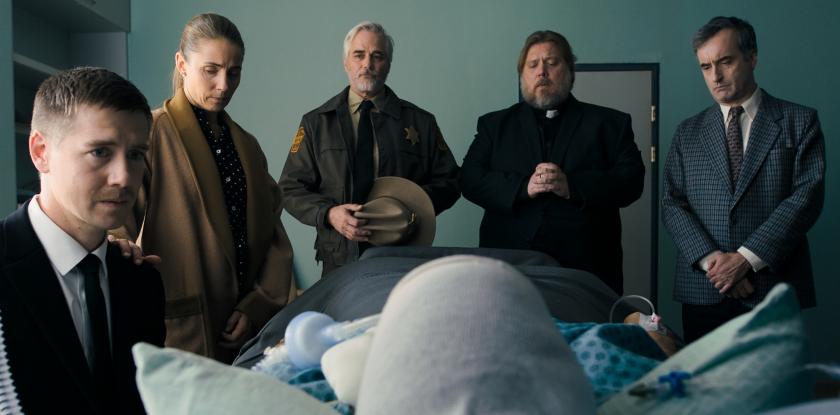The opening shots in The Middle Man show a brooding urban landscape lit only by refinery flames at night. The streets are deserted, with a lone car scuttling across them at an intersection. It’s Nowhereville, North America, though officially it's called Karmack.
This vision of decay suggests anything but a comedy lies ahead. In fact, it’s hard to say precisely what kind of film this is. It's definitely a morality tale in which individuals contend with powers beyond their control: the law, the church, the medical profession, fate. But a comedy? Only the kind Dante wrote, perhaps: a depiction of human life where, despite all, hope hasn’t been abandoned.
Our potential Everyman is Frank Farrelli (Pal Sverre Hagen), a mild-mannered railway ticket-seller who was laid off when the trains stopped stopping in the town. We first see him being interviewed by the Commission: the Karmack county sheriff (Paul Gross), the local pastor (Nicolas Bro), and the medical officer (Don McKellar). Frank has an even higher authority to answer to: his widowed mother.
The job Frank is up for is that of the “middle man”, an official envoy whose role is to deliver news – usually bad news – to the local citizenry. Which is the kind of news the town specialises in, being almost biblically plagued with accidents and fatalities. Frank’s own family was stricken when he was young and his father fell off a ladder onto a scythe.
Frank gets the job over a man with bad skin, Bob (Trond Fausa Aurvag), hereafter nicknamed Pimple Face. Bob is the ex of Blenda (Tuva Novotny), a stylish blonde who works at the town hall and now takes an interest in Frank. This setup is quietly created but ultimately proves explosive, and we will watch as its lit fuse slowly winds its way to the powder keg.
Based on a novel by Lars Saabye Christensen and written and directed by Norway's Bent Hamer, the film is being touted as one for Coen Brothers fans, possibly because there are little hints of Fargo in its plotting and thematics. But whereas Fargo’s dramatic orchestral score announced a cod-epic story with an unlikely heroine, here the mood is much lower key, and the soundtrack music is a country-style guitar blues. There's fun to be had watching the slow-moving loops of the plot tighten on Frank just as he is feeling like a worthwhile human being again. But I’d say Roy Andersson’s bleakly comic work is a better fit than the Coens.
 Frank (Pal Sverre Hagen, pictured right) is no Marge Gunderson: he’s essentially adrift, trying to think his way out of hopelessness in a town with no jobs. He is seen locally as a tagger-along, accident-prone, a Jonah even.
Frank (Pal Sverre Hagen, pictured right) is no Marge Gunderson: he’s essentially adrift, trying to think his way out of hopelessness in a town with no jobs. He is seen locally as a tagger-along, accident-prone, a Jonah even.
But suddenly, he has a job, and the new black suit and resprayed old car that go with it; and he has an interesting girlfriend in Blenda, who lives in the apartment next to the ironically named Grand Theatre, the shuttered cinema her father used to run. Blenda is like Billy Liar's Julie Christie to Frank’s Tom Courtenay – a woman who comes with the promise of escape to a much more vibrant life.
The big question for Frank, and for the viewer, is: how much of all this should be taken at face value? What is this job, really? Does it make Frank a moral man? What is a moral man, anyway? Frank’s lot is to tell parents their children are dead or dying, and worse. Is his moral compass up to it?
Hagen is a good choice for this odd lead role. He looks like a classic junior manager, tall and stiff, with a brush cut and pleasant face. Overly eager to please to start with, he gradually reveals his disturbed emotional landscape, his face mapping the implosion of many of his certainties. But he’s ultimately sympathetic compared with the Karmack sheriff, a figure of unbending rectitude. Casting Gross in this role really shows comic intent: the sheriff is almost a riff on the model Mountie of the TV series Due South, though he's armed with a more sinister power.
The casting overall is spot on, mixing fine character actors from Denmark and Canada, such as the Hitchcock-shaped Bro and the excellent Twin Peaks actor Kenneth Welsh, who plays the father of Frank’s best friend. Where the film stumbles is in its closing section, after a big twist has set up expectations of a grand finale that never comes. Throughout there seem to be hints that a larger metaphor is at play beneath the surface; if there is one, it’s too submerged. Still, with its po-faced, spare storytelling, The Middle Man is worth a look.















Add comment